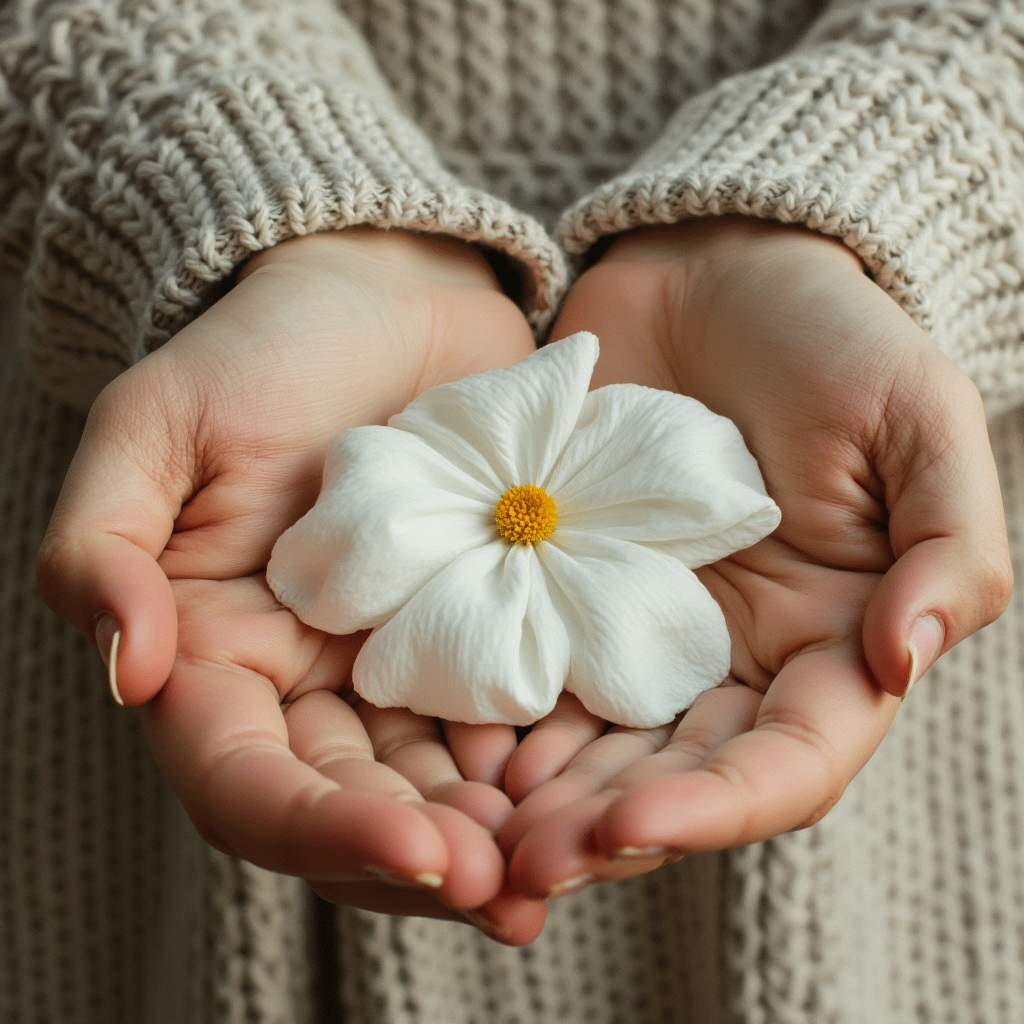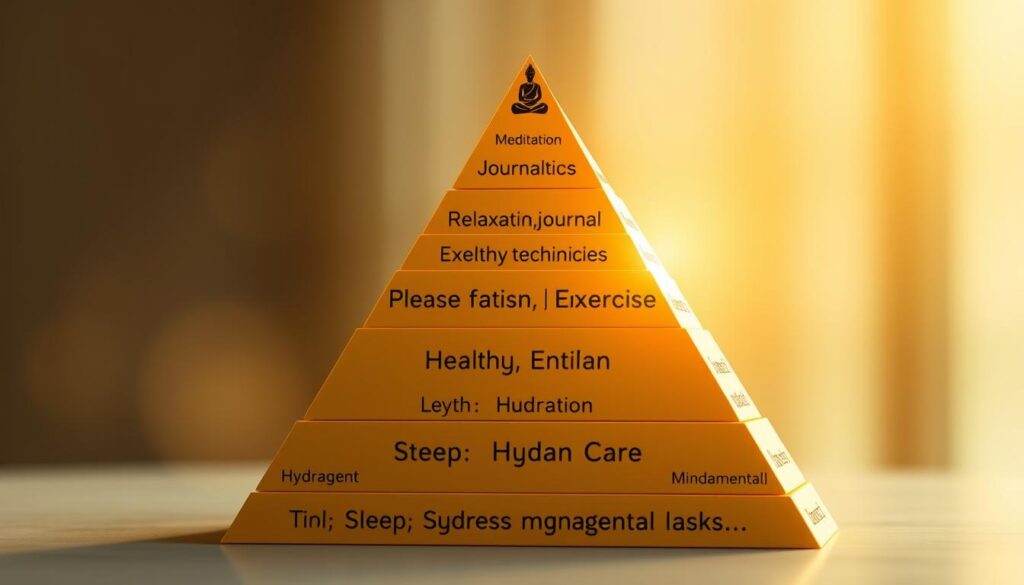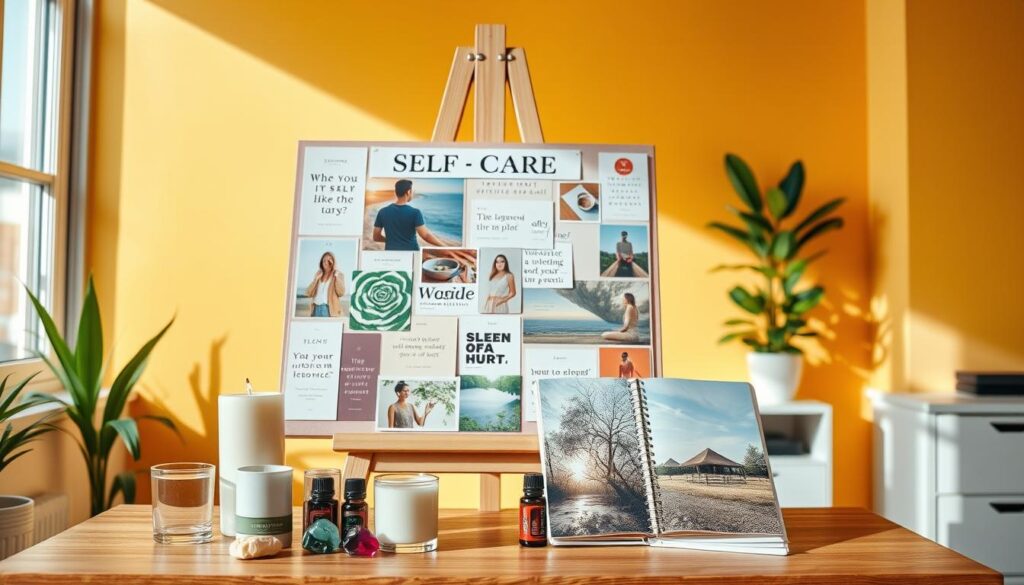Self-Care Ideas
I think it’s key to take care of myself to stay healthy. Self-care is more than just pampering. It’s about building a self care pyramid that focuses on my body, mind, and spirit. By adding self-care to my daily life, I can feel better and handle stress better.
The National Institute of Mental Health says mental health is about feeling good emotionally and socially. Self-care is a big part of keeping our minds healthy. It helps us get better if we’re struggling with our mental health. In today’s busy world, understanding self-care is crucial for our health. https://naturalnicehealth.com/category/care-ideas/
Table of Contents


Understanding the Self-Care Pyramid
Exploring self-care, I see how vital the self-care pyramid is. It has physical, mental, and emotional parts, all key for feeling good. To care for myself, I focus on activities like exercise, eating right, and getting enough sleep.
The self-care pyramid shows us the need for physical, mental, and emotional care. It helps me spot where I need to focus and create a self-care plan. With over 45 million posts on Instagram about self-care, it’s clear many want to improve their well-being.
Maslow’s hierarchy of needs tells us to start with basic needs like air, food, and sleep. These are the base of the self-care pyramid. Moving up, we look at safety, love, esteem, and self-actualization needs. Self-care should aim for long-term benefits, not just quick fixes.

Physical Self-Care Foundation
Physical self-care includes exercise, healthy eating, and sleep. These are key for staying healthy and avoiding burnout. Setting healthy boundaries is also vital, as 76% of people feel overwhelmed without them.
Mental Health Components
Mental health includes managing stress, being mindful, and connecting with others. Good social connections are crucial for our mental and physical health. Studies show self-compassion can cut anxiety and depression by 25% to 50%.
Emotional Well-being Elements
Emotional well-being involves knowing ourselves, accepting ourselves, and being kind to ourselves. Self-awareness boosts emotional intelligence by 30%, improving relationships and personal satisfaction. Self-forgiveness can increase emotional well-being by 50%, helping us grow and become more resilient.
Creating Your Personal Self-Care Vision
To make a self-care plan that fits you, you need a personal self-care vision. This means setting goals like reducing stress or better sleep. Self care examples include meditation, yoga, or reading to help you relax and lower anxiety.
Having a clear vision helps you know what you want to achieve. Start by setting short-term, medium-term, and long-term goals. For example, your short-term goal might be to meditate for 30 minutes a day. Your medium-term goal could be to sleep better every night.

Some ways to stay calm are taking a 10,000-step walk, drinking 8 glasses of water, or spending 1 hour each evening on relaxing hobbies like journaling. Adding these to your daily routine can boost your health. A self-care vision board can also motivate you, keeping you on track with your goals.
Here are some tips to create an effective self-care vision board:
- Reflect on your goals and priorities
- Choose images and words that resonate with your vision
- Update your vision board regularly to reflect changes in your priorities
Essential Physical Self-Care Practices
Physical self-care is key for staying healthy and feeling good. Regular exercise, good sleep, and a balanced diet help our mental health. These habits can be part of our weekend self-care routine. By doing them daily, we can boost our mental health and life quality.
Some important physical self-care practices include:
- Movement and exercise, such as yoga or walking, to reduce stress and improve mood
- Sleep hygiene, including establishing a consistent sleep schedule and creating a relaxing bedtime routine
- Nutrition basics, such as eating a balanced diet with plenty of fruits, vegetables, and whole grains
Adding these physical self-care practices to our daily routine helps our mental health. It makes self-care a big part of our lives. A regular weekend self-care routine keeps us on track and balances work and life.
Mental Health Self-Care Strategies
When I focus on my mental health, I find many self care rewards. Mindfulness, like meditation and deep breathing, helps lower stress and boosts mood. Spending time with loved ones or joining groups also offers emotional support and a sense of belonging.
Some effective self care examples include
- Practicing self-compassion and maintaining a kinder inner dialogue
- Engaging in physical self-care activities, such as exercise, to decrease levels of depression, stress, and anxiety
- Getting quality sleep to improve decision-making, learning, emotional regulation, and focus
By adding these mental health self-care strategies to my daily life, I can enhance my mental well-being. A 2021 study showed that self-care, like mindfulness, can make us happier at work and lower burnout risk. I can enjoy these rewards by making self-care a key part of my life and trying different self care examples to find what suits me best.
Building Your Weekend Self-Care Routine
Reflecting on my self-care journey, I see how crucial it is to spend time alone, mainly on weekends. A good weekend self-care plan can help me recharge for the week ahead. It boosts my well-being and productivity.
Setting aside 30 minutes daily for meditation, yoga, or journaling is simple yet effective. Research shows that 70% of people find journaling good for their mental health. I also love spending time outdoors, whether walking or sitting in a park, to relax and lower stress.
My top weekend self-care activities are:
- Practicing yoga or meditation to calm my mind and reduce stress
- Engaging in physical activities like walking or jogging to boost my mood and energy
- Reading a book or listening to music to unwind and relax
By focusing on my weekend self-care, I sleep better, feel more energetic, and overall, I’m better. Remember, taking care of yourself is key. So, take a few minutes each day to focus on your healing self http://Health – Naturalnicehealth and see amazing changes in your life.
Self-Care Rewards That Actually Work
As I focus on self-care, I’ve learned how key self care rewards are. They can be as simple as a relaxing bath, reading a book, or enjoying coffee alone. By adding self care rewards https://naturalnicehealth.com/category/care-ideas/ to my daily life, I feel a sense of achievement and motivation to keep caring for myself.
Studies show that self-rewards can increase dopamine, which helps us feel good about ourselves. With over 150 ways to reward myself, I can pick activities and treats that make me happy. Self care examples like massages, bubble baths, and meditation help me relax and feel better.
Some of my top self care rewards include:
- Doing physical activities, like playing with pets or kids for 15 minutes
- Taking short breaks, like a 20-minute nap, to boost productivity and clear my mind
- Doing creative things, like puzzles or art, to take a mental break and spark creativity
By celebrating my achievements with self care rewards, I boost my self-esteem and confidence. I encourage you to try different self care examples and find what works for you. Remember, self care rewards are key to motivating us to care for ourselves. With so many options, you’re bound to find activities that make you happy and fulfilled.
Healing Through Self-Care: Recovery Practices
My journey of self-discovery and recovery has shown me the power of healing self through self-care. By adding selfcare tips mental health to my daily life, I’ve managed stress and anxiety better. This has made my life more balanced and fulfilling.
Effective ways to handle stress include deep breathing, progressive muscle relaxation, and meditation. Journaling or talking to a friend can help release emotions. Mindfulness activities like yoga or walking bring calm and well-being.
Here are more self-care practices for recovery:
- Getting enough sleep (8-10 hours per night) to help regulate emotions and reduce stress
- Engaging in regular physical activity, such as cycling or swimming, to improve mood and overall health
- Practicing spiritual self-care, such as meditation or nature connection, to cultivate a sense of purpose and meaning
By focusing on self-care and adding these practices to my routine, I’ve kept my sobriety and improved my mental health. Remember, recovery is a lifelong journey. Self-care is key to maintaining sobriety and achieving well-being.
Creating Calm: Daily Self-Care Habits
My self-care journey has shown me how vital daily habits are for calmness. By adding selfcare tips to my daily routine, my mental health has greatly improved. Starting the day with mindfulness, like meditation or deep breathing, sets a positive tone and lowers stress.
It’s crucial to take breaks and use midday reset techniques, like short walks or stretches. These help me recharge and refocus, making me more energetic for tasks. In the evening, I unwind with reading or a warm bath, preparing for a good night’s sleep. These habits help me manage stress and keep my mental health in check.
Some effective ways to stay calm include:
- Engaging in regular physical activity, such as walking or yoga, to reduce stress and anxiety
- Practicing relaxation techniques, like meditation or deep breathing, to calm the mind and body
- Getting enough sleep each night to help regulate emotions and reduce stress
By making self-care a daily priority, I’ve seen a big improvement in my well-being. Remember, taking care of your mental health is key. By adding selfcare tips and ways to stay calm to your daily habits, you can lead a more balanced and fulfilling life.
Making Self-Care Sustainable
To make self-care last, it’s key to make it a daily habit. Start by setting achievable goals and making a self-care plan. This plan should include selfcare tips mental health and a self care pyramid for your well-being.
A good self-care plan is gentle and made up of small steps. It’s important to balance work and personal life. Find “mudrooms” or rituals to move from public to personal self. Having a care community can help stick to your self-care plan.
Some selfcare tips mental health are yoga, journaling, and reading. These can lower stress, boost mood, and give more energy. Use a self care pyramid to focus on the most important self-care activities first.
By adding self-care to your daily life and using a self care pyramid, you take care of your body, mind, and spirit. This can make you more focused, energetic, and happy.
- Improved mental and physical health
- Increased energy levels
- Enhanced mood
- Better work-life balance
Conclusion: Embracing Your Self-Care Journey
Starting my self-care journey has given me a new sense of purpose. I’ve learned how important it is to take care of myself. By doing things like exercising regularly and practicing mindfulness, I’ve seen big changes in my life.
This article has helped me understand the self-care pyramid and how to find what works best for me. Adding small self-care steps to my day has made me more focused and happy. It’s shown me how to handle stress better.
I’m ready to keep going on this self-care path. I know it won’t always be easy, but I’m up for the challenge. By focusing on my well-being, I’m ready to face life’s ups and downs with strength and peace. This is just the start of my journey to health and happiness.
FAQ
What is the self-care pyramid?
The self-care pyramid focuses on physical, mental, and emotional care. It starts with physical care like exercise and healthy eating. Then, it moves to mental health, including stress management and mindfulness.
Lastly, it covers emotional well-being, like self-awareness and self-acceptance.
Why is it important to create a personal self-care vision?
Having a personal self-care vision is key to making a self-care plan that fits you. It helps set goals, like reducing stress or improving sleep. It also guides you to choose activities that help you relax.
By setting a clear vision, you can focus on what you want to achieve. This makes it easier to prioritize self-care.
What are some essential physical self-care practices?
Essential physical self-care includes moving and exercising to reduce stress and boost mood. Good sleep hygiene is also crucial for both body and mind.
Eating a balanced diet provides the body with the nutrients it needs to function well.
How can mental health self-care strategies improve well-being?
Mental health self-care, like meditation and deep breathing, can lower stress and improve mood. Spending time with loved ones or joining groups can also offer emotional support.
These activities help you feel connected and supported.
What are some examples of self-care rewards?
Self-care rewards can be simple, like taking a relaxing bath or reading a book. Adding these rewards to your daily routine can make you feel accomplished and motivated.
How can self-care recovery practices aid in healing?
Self-care recovery practices, such as deep breathing and journaling, help process emotions and reduce stress. Mindfulness exercises like meditation and yoga also promote calm and well-being.
How can daily self-care habits create calmness?
Daily self-care habits, like morning mindfulness and evening relaxation routines, set a positive tone. They help recharge and refocus, leading to a restful night’s sleep.
What are some tips for making self-care sustainable?
To make self-care sustainable, prioritize it and include it in your daily routines. Set realistic goals and create a self-care plan. Seek support from loved ones or professionals.
This ensures you’re taking care of your physical, mental, and emotional health.

